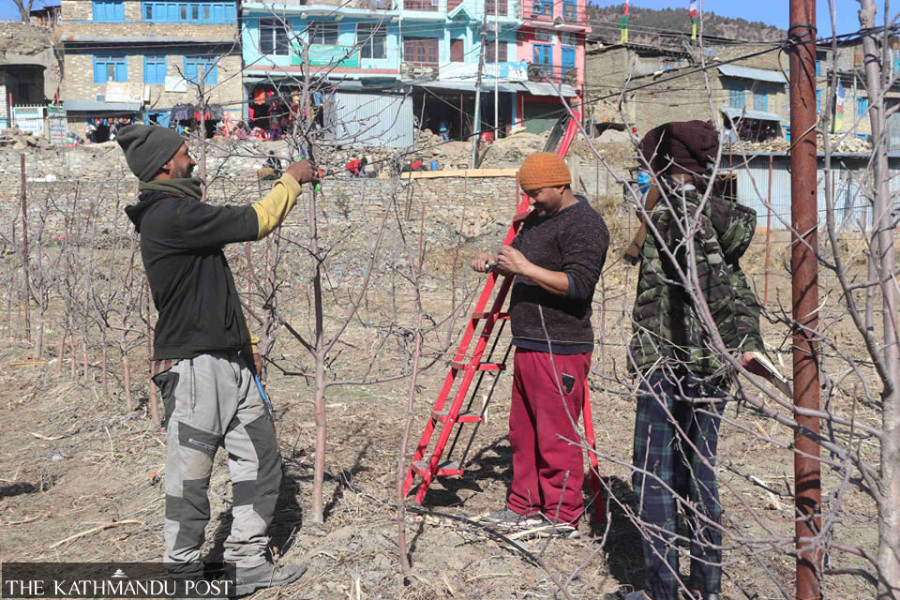Money
Apple farmers in Jumla go commercial as sales jump
After Jumla became linked to the national road network that eased access to market, farmers say their income has increased severalfold.
LP Devkota
Jumla in north-western Nepal, once associated with the back of beyond, is emerging as a prolific producer of apples. With demand for the fruit rapidly growing, farmers are investing large amounts to go into commercial production.
An apple farmer can earn Rs100,000 to Rs500,000 annually. After Jumla became linked to the national road network that eased access to market, farmers say their income has increased severalfold.
Before Karnali Highway was constructed in 2007, apple farmers in Jumla had no way to send their harvest to market; and they used to sell their apples at whatever price they could get, which was sometimes less than Rs5 per kg. Now things have changed.
The most popular apple variety grown in Jumla is Fuji which farmers started planting a few years ago. Jumla district is home to the country’s largest Fuji apple orchard at Jaljala, Guthichaur Rural Municipality.
Apple grower Min Bahadur Bhandari started commercial cultivation of Fuji apple by constructing a modern orchard in Jaljala with an investment of around Rs80 million. He has planted 30,000 apple saplings.
“I have built a modern infrastructure on 15 hectares of the orchard,” said Bhandari, the president of Guthichaur Agro Farm.
Local varieties of apples cover 3,450 hectares in Jumla.
Lokdarshan Shrestha, proprietor of Jumla Agro Farm, started commercial cultivation of Fuji apple for the first time in 2020 by leasing land from the Chandannath Bhairavnath Guthi Management Committee.
Hamro Krishi Cooperative has also started commercial farming of apples.
Balakaram Devkota, chief of the Agriculture Development Office, said farmers' attraction towards Fuji apples has been increasing day by day in the district. "More and more farmers are investing in apples, particularly the Fuji variety," he said.
Even smallholders are going into commercial farming. Farmers of Hiyakhola, Tatopani Rural Municipality-6 have built a model apple orchard on 19 hectares.
The orchard has been constructed with the support of the Malika Apple Production Farmers’ Group and financial aid from the Prime Minister Agriculture Modernisation Project’s apple super zone and Tatopani Rural Municipality.
The Agricultural Research Centre has also invested in the farm where 4,500 local varieties of apple saplings have been planted. More than 200 farmers of Hiyakhola, Dhaulapani and Hanku are engaged in the project.
Nawaraj Neupane, chairman of Tatopani Rural Municipality, said that he was excited to see the locals' attraction towards commercial apple farming. He said the government at all three levels has been increasing the subsidies provided to apple farmers in Jumla recently.
The District Agriculture Development Office is providing apple saplings which cost Rs25 each at the subsidised rate of Rs2. The provincial government is also giving subsidies for apple orchard construction, fencing and irrigation, said Devkota.
The local government has been spending nearly Rs50 million annually for apple cultivation. Farmers are engaged in orchard management to enhance the quality of apples in Jumla.
Last month, there was heavy snowfall in the district, and farmers are happy as they say that it will boost production.
Apple grower Maya Kumai of Chandannath Municipality-10 says her five-member family is engaged in pruning the saplings. Pruning reduces the incidence of pests in apple saplings and enhances the quality of the fruits, she said.
Purna Dhital of Guthichaur said farmers were going into commercial scale as traders have been coming to buy their harvests after Karnali Highway was opened.
The 232-km Karnali Highway stretches from Bangesimal in Surkhet to Khalanga in Jumla. The then prime minister Girija Prasad Koirala laid the foundation stone of the highway in 1992, but the track was opened only in 2007.
Farmers used to sell apples at Rs5 per kg before the road was built. Now they get at least Rs70 per kg.
The District Agriculture Office has been running apple pruning campaigns in coordination with the local level.
Agricultural technicians are assisting farmers to apply manure after pruning the apple saplings and make bio pesticides.
Farmer Hari Shahi said that timely pruning of apple saplings would increase production.
The number of people cultivating apples in Jumla soared after the implementation of the "one house, one orchard" programme. Although apples can be cultivated on 10,000 hectares in Jumla, only 3,000 hectares have been utilised.
Apple is being produced on only 850 hectares.
Kantika Sejuwal, mayor of Chandannath Municipality, said apples were the main source of income for farmers in Jumla.
Jumla was declared an organic district in 2009. Since then, apple farming has been started as a campaign. Farmers also make apple juice and dried apples including brandy which are in high demand.




 9.7°C Kathmandu
9.7°C Kathmandu















